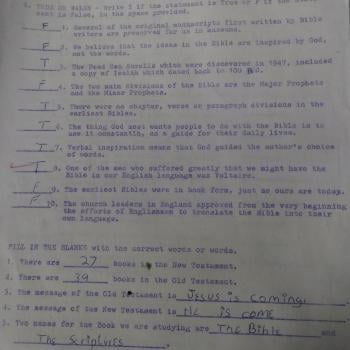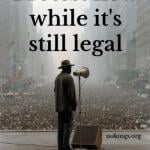Somewhere, at some point, I’m sure, someone must surely have cited Matthew 18:15-17 honestly and accurately, sincerely trying to be true to the spirit and the meaning of that passage. That’s probably happened too.
But 99 percent of the time that biblical text is invoked it’s by someone who’s being an insufferable, sanctimonious git.
Matthew 18:15-17 is one of the most abused passages in the Bible. It’s a slice from a series of pericopes in which Jesus is teaching about forgiveness. Forgiveness is important. And what Jesus had to say about forgiveness here is, as usual, pretty scary. Forgive others and you will be forgiven, Jesus said. Refuse to forgive others and forgiveness will be refused to you.
That’s daunting stuff — so much so that we tend to tune it out, even when we’re reciting it as part of the Lord’s Prayer (“forgive us our debts as we forgive our debtors“).
Matthew 18:15-17 is actually the least intimidating part of this little string of stories about forgiveness. It’s followed by the whole “70 times seven” bit, and then by the parable of the unforgiving — and therefore unforgiven — servant. Compared to those passages, Matthew 18:15-17 seems like a modest, pragmatic bit of advice. Here’s what it says:
If another member of the church sins against you, go and point out the fault when the two of you are alone. If the member listens to you, you have regained that one. But if you are not listened to, take one or two others along with you, so that every word may be confirmed by the evidence of two or three witnesses. If the member refuses to listen to them, tell it to the church; and if the offender refuses to listen even to the church, let such a one be to you as a Gentile and a tax-collector.*
The problem here is not with the passage itself, but with how it is used and abused. Christians who have treated others badly — who have, in fact, sinned against their brothers and sisters — treat this text like it’s their Miranda rights. They appeal to a legalistic application of this passage to distract from the wrong they have done. And thus Matthew 18 has become a refuge for scoundrels.
That’s Jesus speaking there in Matthew 18:15-17 — the same Jesus who also said things like this, from Matthew 5:39: “If anyone strikes you on the right cheek, turn the other also.” Imagine you’re greeting the pastor after the service on Sunday. You reach out to shake his hand and he wallops you on the right cheek. And then he does it again, and again, and again. And as he’s standing there, hitting you in the face, he piously reminds you that as a good Christian you’re required to “follow the Matthew 5:39 process” and turn the other cheek.
That’s exactly how Matthew 18:15-17 is usually invoked. That is the primary function of “the Matthew 18 process.” It has been twisted into a device for putting the onus on the victim — and for preventing any discussion of getting this person to stop hitting you in the face.

One important thing about both of these teachings of Jesus is that they’re about conflicts between two, and only two, people. Both of them get quite a bit more complicated when there’s a third party involved. “If anyone strikes you on the right cheek,” Jesus said, “turn the other also.” But what if they strike someone else? “If another member of the church sins against you,” Jesus said, “go and point out the fault when the two of you are alone.” But what if the other member of the church sins against someone else? You can’t turn someone else’s other cheek. Nor can you require someone else to do so.
Jesus’ teaching on forgiveness is, like most of Jesus’ teaching, a threat to power and to The Powers That Be. Forgiveness inverts the power-dynamics that favor TPTB — making them the supplicants and putting their victims in charge and in control. That terrifies TPTB, so they’ve set out to eliminate that threat by twisting Jesus’ upside-down teaching back into something they regard as right-side up, reasserting their power and control over others by demanding that they be forgiven for their every crime, injustice and abuse. This perversion of forgiveness — this attempt to turn it into something that can be compelled and commanded and required — turns mercy into a tool of oppression. That’s the sort of despicable maneuver that made gentle Jesus meek and mild start talking about millstones and saying things like, “in anger his lord handed him over to be tortured.”
Yes, Jesus taught us to forgive one another — not seven times, or 70 times, but 70 times seven times. But that does not mean that if you steal from me 77 times you’re entitled to recoil in holy offense when I call you a thief. That does not mean I can punch you in the face 489 times and then pretend I’m more righteous than you are because you demand that I stop.
Samantha Field has been dealing with the sanctimonious liars of the Matthew 18 Police ever since she threatened the unjust status quo of TPTB by exposing the dismal history of enabling abuse at fundamentalist institutions (see: “‘God Is Done With You’: Pensacola Christian College and Sexual Violence”). As she wrote yesterday, the Matthew 18 Police have been telling her:
If you wanted things to change, you should have approached the administration privately. You should have engaged in conversation with them, shown them gently and lovingly how they were failing, and worked with them in Christ to make things better.
You should have followed Matthew 18.
There it is. Again, 99 percent of the time, this is the way this passage is used and abused — as a cudgel to beat truth-tellers back into silence. How dare you expose my wrong-doing? Jesus commanded you to come to me privately, so that we could work this out just between the two of us, and so that I would have time to organize a cover-up and to launch a smear campaign designed to destroy your credibility.
What’s that? You’re upset by the lies I’m spreading about you in that smear campaign? Well, then, you know what Matthew 18 says. You mustn’t complain about those lies or try to correct them publicly, you must first come to me, privately …
That’s a despicable little game. And the way it enlists Jesus as an excuse for this despicable behavior is pretty much blasphemy.
In an odd way, though, I’m pleased to see the Matthew 18 Police rehashing their stale shtick with Samantha. That means her speaking truth to power is having an effect. They only send the Matthew 18 Police when they’re scared that you might be a serious threat. When these clowns arrive, blathering about “The Matthew 18 Process,” that’s a sure sign you’re doing some good. It’s a sign that injustice is worried that its days are numbered.
I’m also encouraged by Samantha’s response to the pious threats of the Matthew 18 Police:
However, Matthew 18 isn’t the only thing the Bible has to say about confrontation (and I also have problems with forcing Matthew 18 to be about confronting power systems, hierarchies, and institutions). There’s also Ephesians 5:
Let no one deceive you with empty words … Therefore do not be partners with them … Have nothing to do with the fruitless deeds of darkness, but rather expose them … everything exposed by the light becomes visible–and everything that is illuminated becomes a light.
What PCC has been doing for decades and that they are continuing to do today are the deeds of darkness. They have done wrong, damaging, hurtful, and evil things in order to protect themselves as an institution, and they are still doing them. I will have nothing to do with it, but will rather expose them.
The same Jesus who gave us the teaching in Matthew 18, after all, also told us this, from Luke’s Gospel:
Nothing is covered up that will not be uncovered, and nothing secret that will not become known. Therefore whatever you have said in the dark will be heard in the light, and what you have whispered behind closed doors will be proclaimed from the housetops.
Jesus himself said that the Matthew 18 Police were doomed to fail. Their efforts to silence and to conceal will ultimately prove useless, and the truth they’re trying so hard to hide will be shouted from the rooftops. More than that — it will be posted online. A 21st-century paraphrase of that passage from Luke might say “what you have whispered behind closed doors will go viral.”
– – – – – – – – – – – –
* This passage is oddly anachronistic (at least in our English translations). Jesus refers to “the church” before there ever was such a thing. And a few decades later, once there was such a thing as “the church,” that church was a community that explicitly embraced Gentiles and tax-collectors. This passage requires two things that cannot exist at the same time. Before Pentecost, there was no “the church.” But after Pentecost, there were no “Gentiles.” The church refused to exclude Gentiles and tax-collectors because Jesus did not exclude them, and because he commanded the church not to exclude them. So it’s kind of weird, here in Matthew 18, for Jesus to be saying this. (The “tax-collector” bit is especially weird in a Gospel attributed to Matthew, who was a tax collector.)
These are some red letters I’m inclined to gray marble.












